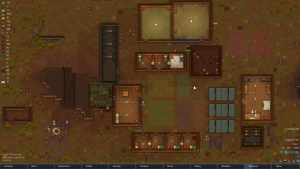Attention to detail
During my ongoing literature review I often discover interesting facts about things I’ve never thought about. Sometimes I can connect these facts with my own observations: The result is mostly a completely new idea why things are as they are. Maybe these ideas are new to you, too. Therefore I’ll share my new science based knowledge with you!
This week: This time, I think about the way how RimWorld simulates a vivid world without overwhelming the player with too many options.
Over the course of the last weeks, I played a lot the computer game RimWorld. RimWorld describes itself as a colony simulator that tells the story of a few people who survived the explosion of their spaceship and stranded on a distant planet. The goal of the game is to build some infrastructure, gather resources, craft gear, defend the colony and research technologies in order to finally construct a new spaceship to leave the planet.

A RimWorld colony.
The player controls the game from an aerial perspective and can give indirect orders to manage the colony. For instance, the player can build a new house by placing a blueprint of the walls and the door. Subsequently, the colonists will gather the required resources and start constructing the building. However, the player can also give some direct orders to the colonists in order to press ahead with a certain task. Furthermore, being able to give direct orders is important in order to defeat some aggressors that occasionally attack the player’s colony. During a battle, the player can draft colonists and control them the same way as in a real-time strategy game in order to defend the colony.
However, the game’s most interesting element is the attention to detail that creates a realistic world without overwhelming the player with too many options. For instance, the temperatures change throughout a year and can drop below freezing during the winter. The temperatures have an effect on the growth rate of crops a player can grow in order to produce food for the colonists. The plants will decay once the temperature drops below freezing, thus requiring the player to fill their storage rooms in advance or build greenhouses to grow crops during the winter time.
Even more impressive is the simulation of a colonist who is represented by four main categories: gear, character, needs and health. The gear section allows the player to equip the colonists with weapons and apparel that protects them against the elements and during a fight. A colonist’s character provides the player with a short backstory about the colonist and an overview over the colonist’s capabilities expressed in twelve different skills. Furthermore, a colonist has needs, such as food, rest and joy, that affect the general mood. When the mood is too low, the colonist can suffer under a mental breakdown. Finally, a colonist is represented by its health which is expressed in twelve different values such as consciousness, sight, manipulation and metabolism. In addition, a colonist can have injuries in different body parts that will negatively affect some of the general health values and sometimes even the performance in executing a particular task.

A colonist in RimWorld.
In the end, this attention to detail results in a very realistic and complex simulation of the life in a colony. Despite the complexity of the world, the general gameplay is not too complex and does not overwhelm the players as their main goal is to manage the colony by expanding the infrastructure or improving the defenses, and, as a result of this, the game can successfully be played without getting lost in the micromanagement of each colonist. However, vested players can also spend a lot of time managing every element of the game.
In conclusion, RimWorld successfully demonstrates how a complex world can be simulated without overwhelming the player. The key is to implement fitting variables that contribute to the concept of the game without making them too powerful. By doing so, the game receives a higher substantiality without requiring the player to take care of every single option. Nevertheless, vested players can start to care about every single value and achieve a better performance in their gameplay.